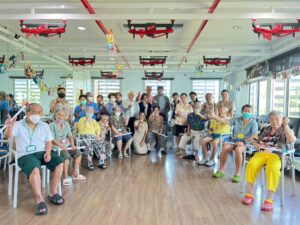【2023. 8. 18】"朝日新聞 with Planet" にてプロジェクトの特徴が解説されました!/ Project's Characteristics explained in Japanese News Article "The Asahi Shimbun with Planet"

8月18日、朝日新聞デジタルの特集ページ「with Planet」において、当SMART & STRONG プロジェクトの特徴が掲載されました。
東京都市大学の沖浦文彦教授により、「今までの援助とは異なるユニークな取り組み」として、プロジェクトマネジメントの面から解説していただきました。
下記の記事からご覧ください!
On August 18th, SMART & STRONG Project's characteristics were introduced at Japanese News Article, The Asahi Shimbun Digital's "with Planet" page.
Prof. Fumihiko OKIURA from Tokyo City University analyzed and explained this project from the management perspective, and described it as "a case of unique initiative which is different from conventional international aid/development cooperation."
Please refer to the article written in Japanese and the tentative summary of its content in English below.
Tentative Summary of This Article
In many low or middle-income countries, including those with a relatively young population, the challenges of aging populations are becoming increasingly evident. Thailand, a Southeast Asian nation that has achieved significant economic growth and advanced to the status of a middle-income country, is already grappling with the issue of elderly care due to its aging population. While the concept of extended families with three generations living together remains prevalent, concerns about the sustainability of such arrangements are growing. Consequently, both the central government and local authorities in Thailand have begun focusing on new systems and initiatives to address the challenges posed by aging.
Taking cues from Japan's experience in caregiving and rehabilitation technology, Thailand has initiated a unique international cooperation project aimed at adapting to aging demographics. This project involves building networks at the local level and encouraging autonomous learning among municipalities to collectively find effective solutions for elderly care. Unlike conventional official development assistance (ODA) projects, this approach emphasizes collaborative learning and adapting strategies to the specific circumstances of each community.
This cooperation, known as the "SMART&STRONG Project," utilizes grassroots networks connecting Thai municipalities, Japanese local authorities, Thai universities, and Japanese non-profit organizations. It emphasizes shared experiences and discussions to develop tailored solutions, encouraging participating municipalities to take ownership of their initiatives. Japan's role is to facilitate learning opportunities rather than providing direct financial support, promoting a sustainable approach to elderly care.
This innovative approach seeks to foster a continuous exchange of knowledge and experiences between countries and municipalities. It transcends traditional aid dynamics and fosters a sense of camaraderie among participants, aligning with the evolving landscape of international cooperation. Through cross-border learning, this "SMART&STRONG Project" aims to create a meaningful impact on how societies approach the challenges of aging populations and elder care.



